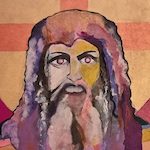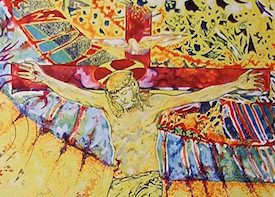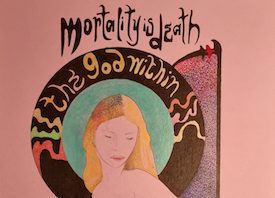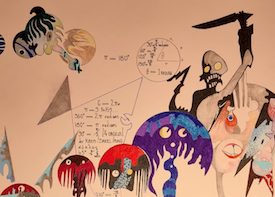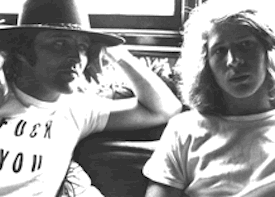Much of the content of visionary Christian Jim Overbeck’s writings concerns the possibility, actuality and evidence of deification (theosis); and, conversely, the noticeable lack of it in this (fallen) world. As he writes: “Obviously governments cannot see Him or they would not be ripping the shit out of each other’s populations.” With this trenchant observation on ‘the way of the world’, here are some brief extracts on deification by someone who has seen God, and indeed has become God, which give a glimpse into his genius – the genius of theosis. Unless otherwise indicated, all quotations are taken from Overbeck’s seminal work, The Autobiography of God Almighty (paperback version, 2003).
A few definitions concerning man:
- Man is imperfect. Hence man is incomplete. (p 32)
- An incomplete man is an individual. ( ” )
- A person is a perfect man. ( ” )
- A man is an imperfect god. (p 35)
- A god is a complete man. ( ” )
Thus to be a perfect and complete human, it is necessary to be made divine by (& in) Christ:
Man is made in the image and likeness of God. Man is the perfect image of God, not the imperfect image…. The image is God.
There is no such thing as a ‘human being’ in earthly terms; only a ‘human becoming’:
- Humans come to be as they be-come towards God’s being. (p 63)
Deification admits of degrees:
- One is admitted to the dimensions of Christ. (p 42)
- One becomes like God. ( ” )
- One becomes a god. ( ” )
- One becomes God. ( ” )
In becoming God, one does not lose one’s identity, one gains it:
- The good receive uncreated light as a gift, not as a loan – i.e. in God one’s true identity is given back. Temporally-created identity is false identity. Man’s true identity is not flesh, which is subject to death. God confers immortal identity on those who love Him. (p 43)
- One’s real identity – a god – always watches its own mutated fragmentation in worldly activity… (p 122)
A few definitions concerning God:
- God is not made in the image of man. (p 56)
- God has always been perfectly human, thus Christ. (p 50)
NB Christ baffled and angered the Jews by saying: “Before Abraham was born, I AM.” (John 8.58)
- Almighty God is the arche of uniqueness (p 315)
. . hence we are all unique – all created in the image and likeness of Christ, yet each with our unique divine personhood – from which comes our real earthly personality, when it is allowed to shine through. Overbeck explains that we are in fact part of God’s eternal creation:
- God is Creator by virtue of His eternal creation (Origen). Thus… man is resurrected as himself, because he is that eternal creation. (p 185)
- Defining the Almighty would be like cupping roaring oceans in a thimble. (p 42)
On becoming a god
- Within each fallen being there is a god (and goddess) called to become high human (truly human), whose atemporality supercedes and includes temporal history. (p 160)
- When homoiosis [becoming like God] is complete, the image of God is fully restored – indeed, man becomes God by energy (a god)… which is the backbone of orthodox Christianity, something that one can experience. (p 189)
- What does one actually mean in saying ‘a god’ or ‘becoming a god’?… A god is an iridescent superfluity…. Love makes a god: only love makes a god: any god who is not love is destroyed by love. (p 226)
- A true man passes beyond historical confines, beyond the entire spatio-temporal context. Man’s flesh is replaced by [uncreated] light… (p 42)
- The sons and daughters of God do not blend with the world: they surpass it. (p 43)
- The divine prosopa [faces] of the sons and daughters of God – viz. the gods – reverse the voluntary repression implicit in masks of flesh. (p 166)
- metanoia – ‘conversion’ – returns the concrete to the god literally… by a miraculous change of flesh & appearances related to flesh. (p 210)
- Becoming a god is easy: becoming God Almighty – “the highest pinnacle of aspiration” (Basil of Cappadocia) – is extremely difficult. (p 240)
On the experience of Theosis
- It is natural to be divine, un-natural not to be. (p 98)
- In deification… one becomes a being of light… entering the furnace of Lord God Almighty’s mightiest love. (p 142)
- Deification is becoming raised into God, leaving the time & space of earth behind.. it is the acquisition of the divine senses.. (p 264)
- ..in deification the ontological walls of earth are breached & one is shown the secret doors of God. Entering the divine mansions is to enter palaces overflowing with ‘unspeakable’ glory.. (p 265)
The ‘hypostatic union’ is a term used in Christian theology to describe the real union of the divine and the human in the One Person (hypostasis) of Jesus Christ. In deification this also occurs when a man meets God personally.
- A god is denuded of flesh by the actualization of moving light after Christ coincides with the individual hypostatically – personally – and, although this can be seen before, one cannot become a god until the hypostatic union inseparably unites with (and lifts up) what goes before. It is impossible to achieve Trinitarian deification without Christ first granting the total interface of His perfect divine-manhood. (p 119)
The Struggle Upwards
Overbeck describes the struggle upwards, or the struggle to stay up:
- … against earthly enmeshment, a forcible turning-around from compliance in seduction… into deific phos, as out of daylight into divine light… reversing the drives and, initially, whilst awaiting momentum and deific thrust, struggling back through the mutated accretions of flesh & its weighted impositions, with stifled, sometimes audible, groans .. casting down agonies, unleashing the god from the crucified pathway .. and then upwards into the golden lands of Christ’s extra-dimensionality, crying deliverance.. (p 210)
And to conclude this brief overview of Overbeck’s writings on Theosis, the following perhaps gives a reminder of the single-mindedness of his purpose:
- He [the Almighty] is approachable via searching courage,… via loving pursuit,… or via hunting truth… To these and their like, seek to enter the portals of our living God, His Magnificent Holiness gently adorning the Most High Innocence of Intellect, in sights wonderful, marvelous & stupendous – well, do not say you were not told if you think you ‘know better’… (p 167)
